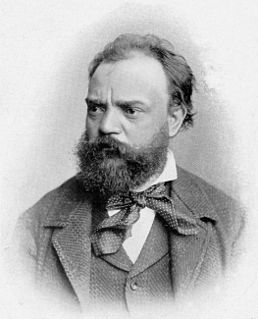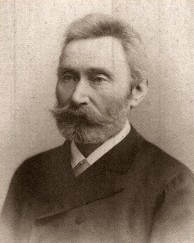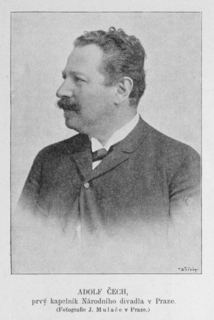
The Symphony No. 8 in G major, Op. 88, B. 163, is a symphony by Antonín Dvořák, composed in 1889 at Vysoká u Příbramě, Bohemia, on the occasion of his election to the Bohemian Academy of Science, Literature and Arts. Dvořák conducted the premiere in Prague on 2 February 1890. In contrast to other symphonies of both the composer and the period, the music is cheerful and optimistic. It was originally published as Symphony No. 4.
The Cello Concerto in B minor, Op. 104, B. 191, is the last solo concerto by Antonín Dvořák. It was written in 1894 for his friend, the cellist Hanuš Wihan, but was premiered by the English cellist Leo Stern.

The Violin Concerto in A minor, Op. 53, is a concerto for violin and orchestra composed by Antonín Dvořák in 1879. It was premiered in Prague in 1883 by František Ondříček, who also gave the Vienna and London premieres. Today it remains an important work in the violin repertoire.
Antonín Dvořák's Serenade for Strings in E major, Op. 22, was composed in just two weeks in May 1875. It remains one of the composer's more popular orchestral works to this day.
Antonín Dvořák's String Quintet No. 2 in G major, Op. 77 (B. 49), was originally composed in early March 1875 and first performed on March 18, 1876 in Prague at the concert of the Umělecká beseda.
Tchaikovsky's Serenade for Strings in C major, Op. 48, was composed in 1880.
Antonín Dvořák composed his String Quartet No. 13 in G major, Op. 106,, between November 11 and December 9, 1895. 1895 was an eventful year for him: he returned to Europe from America in April, and his sister-in-law died in May. Upon finishing No. 13, he took back up his No. 14 (Op. 105) in A-flat major, which he had begun before this quartet and finished it on December 30 of that year. The quartet in G major was given its first performance by the Bohemian Quartet in Prague, on October 9, 1896.

The Piano Trio No. 4 in E minor, Op. 90, B. 166, is a composition by Antonín Dvořák for piano, violin and cello. It is among the composer's best-known works.
The String Quartet No. 14 in A♭ major, Op. 105, B. 193, was the last string quartet completed by Antonín Dvořák, even though it was published before his String Quartet No. 13. Dvořák finished his Fourteenth Quartet in 1895, when he had returned to Bohemia after his visit to America. The gestation of the Quartet had actually begun in America and lasted six months, which was rather protracted for the composer. This Quartet marked an important point in Dvořák's development because he would devote himself almost exclusively to writing explicit program music, namely symphonic poems and operas, afterwards.
The Symphony No. 5 in F major, Op. 76, B. 54, is a classical composition by Czech composer Antonín Dvořák. It was originally published as Symphony No. 3.
Antonín Dvořák wrote his String Quartet No. 10 in E♭ major, Op. 51 (B. 92), in 1879 at the request of Jean Becker, the leader of the Florentine Quartet. It is sometimes nicknamed the Slavonic Quartet. The quartet was dedicated to Jean Becker; it was first performed by the Joachim Quartet at a private chamber music evening on July 29, 1879, in Berlin. It was published by Simrock, Berlin, in 1879.
Serenade for wind instruments, cello and double bass in D minor, Op. 44, B. 77, is a chamber composition by the Czech composer Antonín Dvořák. The work is dedicated to the music critic and composer Louis Ehlert who praised the Slavonic Dances highly in the German press.
Legends, Op. 59, B. 117, is a forty-minute group of ten pieces by the Czech composer Antonín Dvořák. They were written in early 1881 for piano duet and reset later that year for a reduced orchestra (B. 122).

Antonín Bennewitz was a Bohemian violinist, conductor and teacher. He was in a line of violinists that extended back to Giovanni Battista Viotti, and forward to Jan Kubelík and Wolfgang Schneiderhan.

Adolf Čech was a Czech conductor, who premiered a number of significant works by Antonín Dvořák, Bedřich Smetana, Zdeněk Fibich and other Czech composers. He also led the first performances outside Russia of two operas by Pyotr Ilyich Tchaikovsky and the Czech premieres of seven operettas by Jacques Offenbach. He was also a bass singer and a translator of opera librettos.
Antonín Dvořák finished the composition of his String Quartet No. 7 in A minor, Op. 16 (B. 45), on 24 September 1874, having probably started it on or around the 14 September.
Antonín Dvořák composed his String Quartet No. 6 in A minor, B. 40 Op. 12, in November and December 1873, finishing it on 5 December. He later revised it, but at this stage left the work unfinished. After a reconstruction by Jarmil Burghauser, with minimal additions, a first recording was made by the Prager Streichquartett, for Deutsche Grammophon, in March and April 1977.
The String Quintet No. 1 in A minor, Op. 1 (B. 7), is a string quintet by Antonín Dvořák, scored for two violins, two violas and cello. Composed in 1861, it is the first piece to which he assigned an opus number and the work with which he, at age 20, launched his career as a composer. It was not premiered until 1921, 17 years after his death.
The Piano Quintet No. 1 in A major, Op. 5 (B. 28), is a piano quintet by Antonín Dvořák, scored for two violins, viola, cello and piano. Composed in 1872 in Prague, it was premiered in November that year. It was not published then and Dvořák lost the autograph over the years, having to ask a friend for a copy when he revised the work in 1887. The revised version was not performed until 1922, 18 years after his death.
The Piano Quartet No. 2 in E♭ major, Op. 87 (B. 162), is a piano quartet by Antonín Dvořák. It was composed in summer 1889 at his country residence in Vysoká.



